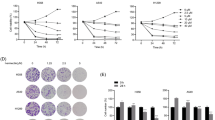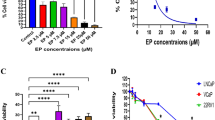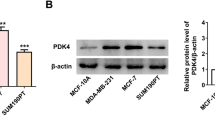Abstract
Purpose
Curcumin (Cur), a yellow-colored dietary flavor from the plant (Curcuma longa), has been demonstrated to potentially resist diverse diseases, including ovarian cancer, but drug resistance becomes a major limitation of its success clinically. The key molecule or mechanism associated with curcumin resistance in ovarian cancer still remains unclear. The aim of our study was to investigate the effects of curcumin on autophagy in ovarian cancer cells and elucidate the underlying mechanism.
Methods
In our study, 3-(4,5-dimethylthiazol-2-yl)-2,5-diphenyltetrazolium bromide (MTT), EdU proliferation assay and colony-forming assay were used to assess cell viability. Apoptosis was detected by western blot and flow cytometric analysis of apoptosis. Autophagy was defined by both electron microscopy and immunofluorescence staining markers such as microtubule-associated protein 1 light chain 3 (LC3). Plasmid construction and shRNA transfection helped us to confirm the function of curcumin.
Results
Curcumin reduced cell viability and induced apoptotic cell death by MTT assay in human ovarian cancer cell lines SK-OV-3 and A2780 significantly. Electron microscopy, western blot and immunofluorescence staining proved that curcumin could induce protective autophagy. Moreover, treatment with autophagy-specific inhibitors or stable knockdown of LC3B by shRNA could markedly enhance curcumin-induced apoptosis. Finally, the cells transiently transfected with AKT1 overexpression plasmid demonstrated that autophagy had a direct relationship with the AKT/mTOR/p70S6K pathway.
Conclusions
Curcumin can induce protective autophagy of human ovarian cancer cells by inhibiting the AKT/mTOR/p70S6K pathway, indicating the synergistic effects of curcumin and autophagy inhibition as a possible strategy to overcome the limits of current therapies in the eradication of epithelial ovarian cancer.






Similar content being viewed by others
References
Grossman DC, Curry SJ, Owens DK et al (2018) Screening for ovarian cancer: US Preventive Services Task Force recommendation statement. JAMA 319(6):588–594. https://doi.org/10.1001/jama.2017.21926
Siegel RL, Miller KD, Jemal A (2018) Cancer statistics. CA Cancer J Clin 68(1):7–30. https://doi.org/10.3322/caac.21442
Corrado G, Salutari V, Palluzzi E, Distefano MG, Scambia G, Ferrandina G (2017) Optimizing treatment in recurrent epithelial ovarian cancer. Expert Rev Anticancer Ther 17(12):1147–1158. https://doi.org/10.1080/14737140.2017.1398088
Bristow RE, Chi DS (2006) Platinum-based neoadjuvant chemotherapy and interval surgical cytoreduction for advanced ovarian cancer: a meta-analysis. Gynecol Oncol 103(3):1070–1076. https://doi.org/10.1016/j.ygyno.2006.06.025
Imran M, Ullah A, Saeed F, Nadeem M, Arshad MU, Suleria HAR (2018) Cucurmin, anticancer, and antitumor perspectives: a comprehensive review. Crit Rev Food Sci Nutr 58(8):1271–1293. https://doi.org/10.1080/10408398.2016.1252711
Qu W, Xiao J, Zhang H et al (2013) B19, a novel monocarbonyl analogue of curcumin, induces human ovarian cancer cell apoptosis via activation of endoplasmic reticulum stress and the autophagy signaling pathway. Int J Biol Sci 9(8):766–777. https://doi.org/10.7150/ijbs.5711
Panda AK, Chakraborty D, Sarkar I, Khan T, Sa G (2017) New insights into therapeutic activity and anticancer properties of curcumin. J Exp Pharmacol 9:31–45. https://doi.org/10.2147/JEP.S70568
Kantara C, O’Connell M, Sarkar S, Moya S, Ullrich R, Singh P (2014) Curcumin promotes autophagic survival of a subset of colon cancer stem cells, which are ablated by DCLK1-siRNA. Cancer Res 74(9):2487–2498. https://doi.org/10.1158/0008-5472.CAN-13-3536
O’Sullivan-Coyne G, O’Sullivan GC, O’Donovan TR, Piwocka K, McKenna SL (2009) Curcumin induces apoptosis-independent death in oesophageal cancer cells. Br J Cancer 101(9):1585–1595. https://doi.org/10.1038/sj.bjc.6605308
Banerjee S, Ji C, Mayfield JE, Goel A, Xiao J, Dixon JE, Guo X (2018) Ancient drug curcumin impedes 26S proteasome activity by direct inhibition of dual-specificity tyrosine-regulated kinase 2. Proc Natl Acad Sci USA 115(32):8155–8160. https://doi.org/10.1073/pnas.1806797115
Weir NM, Selvendiran K, Kutala VK, Tong L, Vishwanath S, Rajaram M, Tridandapani S, Anant S, Kuppusamy P (2007) Curcumin induces G2/M arrest and apoptosis in cisplatin-resistant human ovarian cancer cells by modulating Akt and p38 MAPK. Cancer Biol Ther 6(2):178–184
Saxena V, Hussain MD (2013) Polymeric mixed micelles for delivery of curcumin to multidrug resistant ovarian cancer. J Biomed Nanotechnol 9(7):1146–1154
Abouzeid AH, Patel NR, Sarisozen C, Torchilin VP (2014) Transferrin-targeted polymeric micelles co-loaded with curcumin and paclitaxel: efficient killing of paclitaxel-resistant cancer cells. Pharm Res 31(8):1938–1945. https://doi.org/10.1007/s11095-013-1295-x
Gou Q, Liu L, Wang C, Wu Q, Sun L, Yang X, Xie Y, Li P, Gong C (2015) Polymeric nanoassemblies entrapping curcumin overcome multidrug resistance in ovarian cancer. Colloids Surf B Biointerfaces 126:26–34. https://doi.org/10.1016/j.colsurfb.2014.12.012
Li X, Feng K, Li J, Yu D, Fan Q, Tang T, Yao X, Wang X (2017) Curcumin inhibits apoptosis of chondrocytes through activation ERK1/2 signaling pathways induced autophagy. Nutrients. https://doi.org/10.3390/nu9040414
Sun Y, Jin L, Liu JH, Sui YX, Han LL, Shen XL (2016) Interfering EZH2 expression reverses the cisplatin resistance in human ovarian cancer by inhibiting autophagy. Cancer Biother Radiopharm 31(7):246–252. https://doi.org/10.1089/cbr.2016.2034
Aoki H, Takada Y, Kondo S, Sawaya R, Aggarwal BB, Kondo Y (2007) Evidence that curcumin suppresses the growth of malignant gliomas in vitro and in vivo through induction of autophagy: role of Akt and extracellular signal-regulated kinase signaling pathways. Mol Pharmacol 72(1):29–39. https://doi.org/10.1124/mol.106.033167
Kim JY, Cho TJ, Woo BH, Choi KU, Lee CH, Ryu MH, Park HR (2012) Curcumin-induced autophagy contributes to the decreased survival of oral cancer cells. Arch Oral Biol 57(8):1018–1025. https://doi.org/10.1016/j.archoralbio.2012.04.005
Li B, Takeda T, Tsuiji K, Wong TF, Tadakawa M, Kondo A, Nagase S, Yaegashi N (2013) Curcumin induces cross-regulation between autophagy and apoptosis in uterine leiomyosarcoma cells. Int J Gynecol Cancer 23(5):803–808. https://doi.org/10.1097/IGC.0b013e31828c9581
Tork OM, Khaleel EF, Abdelmaqsoud OM (2015) Altered cell to cell communication, autophagy and mitochondrial dysfunction in a model of hepatocellular carcinoma: potential protective effects of curcumin and stem cell therapy. Asian Pac J Cancer Prev 16(18):8271–8279
Zhang SF, Wang XY, Fu ZQ et al (2015) TXNDC17 promotes paclitaxel resistance via inducing autophagy in ovarian cancer. Autophagy 11(2):225–238. https://doi.org/10.1080/15548627.2014.998931
Zou J, Liu L, Wang Q, Yin F, Yang Z, Zhang W, Li L (2017) Downregulation of miR-429 contributes to the development of drug resistance in epithelial ovarian cancer by targeting ZEB1. Am J Transl Res 9(3):1357–1368
Zhao G, Han X, Zheng S, Li Z, Sha Y, Ni J, Sun Z, Qiao S, Song Z (2016) Curcumin induces autophagy, inhibits proliferation and invasion by downregulating AKT/mTOR signaling pathway in human melanoma cells. Oncol Rep 35(2):1065–1074. https://doi.org/10.3892/or.2015.4413
Guan F, Ding Y, Zhang Y, Zhou Y, Li M, Wang C (2016) Curcumin suppresses proliferation and migration of MDA-MB-231 breast cancer cells through autophagy-dependent Akt degradation. PLoS One 11(1):e0146553. https://doi.org/10.1371/journal.pone.0146553
Maycotte P, Aryal S, Cummings CT, Thorburn J, Morgan MJ, Thorburn A (2012) Chloroquine sensitizes breast cancer cells to chemotherapy independent of autophagy. Autophagy 8(2):200–212. https://doi.org/10.4161/auto.8.2.18554
Sasaki K, Tsuno NH, Sunami E et al (2010) Chloroquine potentiates the anti-cancer effect of 5-fluorouracil on colon cancer cells. BMC Cancer 10:370. https://doi.org/10.1186/1471-2407-10-370
Ren F, Shen J, Shi H, Hornicek FJ, Kan Q, Duan Z (1866) Novel mechanisms and approaches to overcome multidrug resistance in the treatment of ovarian cancer. Biochim Biophys Acta 2:266–275. https://doi.org/10.1016/j.bbcan.2016.10.001
Shao FY, Du ZY, Ma DL et al (2015) B5, a thioredoxin reductase inhibitor, induces apoptosis in human cervical cancer cells by suppressing the thioredoxin system, disrupting mitochondrion-dependent pathways and triggering autophagy. Oncotarget 6(31):30939–30956. https://doi.org/10.18632/oncotarget.5132
Terlikowska KM, Witkowska AM, Zujko ME, Dobrzycka B, Terlikowski SJ (2014) Potential application of curcumin and its analogues in the treatment strategy of patients with primary epithelial ovarian cancer. Int J Mol Sci 15(12):21703–21722. https://doi.org/10.3390/ijms151221703
Solomon VR, Lee H (2009) Chloroquine and its analogs: a new promise of an old drug for effective and safe cancer therapies. Eur J Pharmacol 625(1–3):220–233. https://doi.org/10.1016/j.ejphar.2009.06.063
Boya P, González-Polo RA, Casares N et al (2005) Inhibition of macroautophagy triggers apoptosis. Mol Cell Biol 25(3):1025–1040. https://doi.org/10.1128/MCB.25.3.1025-1040.2005
Nilsson JR (1992) Does chloroquine, an antimalarial drug, affect autophagy in Tetrahymena pyriformis. J Protozool 39(1):9–16
Zhang C, Li B, Zhang X, Hazarika P, Aggarwal BB, Duvic M (2010) Curcumin selectively induces apoptosis in cutaneous T-cell lymphoma cell lines and patients’ PBMCs: potential role for STAT-3 and NF-kappaB signaling. J Investig Dermatol 130(8):2110–2119. https://doi.org/10.1038/jid.2010.86
Guo S, Long M, Li X, Zhu S, Zhang M, Yang Z (2016) Curcumin activates autophagy and attenuates oxidative damage in EA.hy926 cells via the Akt/mTOR pathway. Mol Med Rep 13(3):2187–2193. https://doi.org/10.3892/mmr.2016.4796
Vallianou NG, Evangelopoulos A, Schizas N, Kazazis C (2015) Potential anticancer properties and mechanisms of action of curcumin. Anticancer Res 35(2):645–651
Wang J, Zhang J, Zhang CJ, Wong YK, Lim TK, Hua ZC, Liu B, Tannenbaum SR, Shen HM, Lin Q (2016) In situ proteomic profiling of curcumin targets in HCT116 colon cancer cell line. Sci Rep 6:22146. https://doi.org/10.1038/srep22146
He M, Wang D, Zou D, Wang C, Lopes-Bastos B, Jiang WG, Chester J, Zhou Q, Cai J (2016) Re-purposing of curcumin as an anti-metastatic agent for the treatment of epithelial ovarian cancer: in vitro model using cancer stem cell enriched ovarian cancer spheroids. Oncotarget 7(52):86374–86387. https://doi.org/10.18632/oncotarget.13413
Aggarwal BB, Kumar A, Bharti AC (2003) Anticancer potential of curcumin: preclinical and clinical studies. Anticancer Res 23(1A):363–398
Dong Z, Liang S, Hu J, Jin W, Zhan Q, Zhao K (2016) Autophagy as a target for hematological malignancy therapy. Blood Rev 30(5):369–380. https://doi.org/10.1016/j.blre.2016.04.005
Zhang X, Zhang HQ, Zhu GH, Wang YH, Yu XC, Zhu XB, Liang G, Xiao J, Li XK (2012) A novel mono-carbonyl analogue of curcumin induces apoptosis in ovarian carcinoma cells via endoplasmic reticulum stress and reactive oxygen species production. Mol Med Rep 5(3):739–744. https://doi.org/10.3892/mmr.2011.700
Seo JA, Kim B, Dhanasekaran DN, Tsang BK, Song YS (2016) Curcumin induces apoptosis by inhibiting sarco/endoplasmic reticulum Ca2 + ATPase activity in ovarian cancer cells. Cancer Lett 371(1):30–37. https://doi.org/10.1016/j.canlet.2015.11.021
Vanhaesebroeck B, Guillermet-Guibert J, Graupera M, Bilanges B (2010) The emerging mechanisms of isoform-specific PI3K signalling. Nat Rev Mol Cell Biol 11(5):329–341. https://doi.org/10.1038/nrm2882
Li H, Zeng J, Shen K (2014) PI3K/AKT/mTOR signaling pathway as a therapeutic target for ovarian cancer. Arch Gynecol Obstet 290(6):1067–1078. https://doi.org/10.1007/s00404-014-3377-3
Hu JL, Hu XL, Guo AY, Wang CJ, Wen YY, Cang SD (2017) Endoplasmic reticulum stress promotes autophagy and apoptosis and reverses chemoresistance in human ovarian cancer cells. Oncotarget 8(30):49380–49394. https://doi.org/10.18632/oncotarget.17673
Lin JF, Lin YC, Tsai TF, Chen HE, Chou KY, Hwang TI (2017) Cisplatin induces protective autophagy through activation of BECN1 in human bladder cancer cells. Drug Des Dev Ther 11:1517–1533. https://doi.org/10.2147/DDDT.S126464
Funding
This study was supported by Grants from Natural Science Foundation of Shandong Province (ZR2016HM27) and Science Foundation of Qilu Hospital of Shandong University (no. 2016QLQN27).
Author information
Authors and Affiliations
Contributions
LL: protocol and project development, data management, data analysis, manuscript writing and manuscript editing. YP: protocol and project development, manuscript editing. XZ: data curation, formal analysis. RL: manuscript editing. CJ: manuscript editing. JX: manuscript editing. RD: resources, supervision. PL: protocol and project development, funding acquisition, supervision.
Corresponding authors
Ethics declarations
Conflict of interest
No conflict of interest exits in the submission of this manuscript.
Additional information
Publisher's Note
Springer Nature remains neutral with regard to jurisdictional claims in published maps and institutional affiliations.
Rights and permissions
About this article
Cite this article
Liu, Ld., Pang, Yx., Zhao, Xr. et al. Curcumin induces apoptotic cell death and protective autophagy by inhibiting AKT/mTOR/p70S6K pathway in human ovarian cancer cells. Arch Gynecol Obstet 299, 1627–1639 (2019). https://doi.org/10.1007/s00404-019-05058-3
Received:
Accepted:
Published:
Issue Date:
DOI: https://doi.org/10.1007/s00404-019-05058-3




